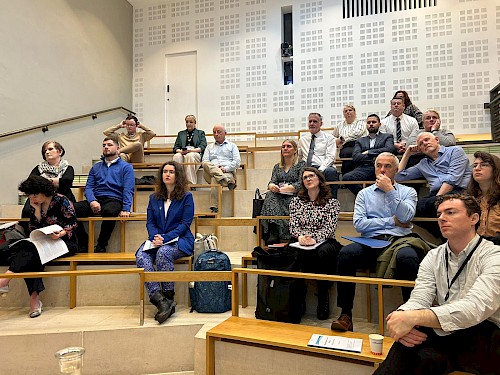Neurodivergence in Irish Prisons
8th November 2024
Irish Penal Reform Trust (IPRT) Executive Director Saoirse Brady was delighted to attend the launch of phase one (scoping exercise) of the Neurodivergence in Irish Prisons project in the AV in Leinster House to hear the findings and recommendations. The project has been funded by Community Foundation Ireland, supported by IPRT and completed by independent researcher Dr Orla Gallagher, resulting in a report with recommendations for phase two and subsequent phases of the project.
Neurodiversity refers to the differences in the ways that peoples’ brains work. Whilst neurotypical peoples’ brains function and interpret information in a way that society expect them to, neurodivergent people learn and process information in a different way. Attention Deficit Hyperactivity Disorder (ADHD) and Autism are two well-known examples of neurodivergence.
Neurodivergence is over-represented in forensic populations. It is estimated that 1 in 3 individuals involved in the Criminal Justice System (CJS) are neurodivergent in some way, with estimates of Autism ranging from 2–18%, and ADHD averaging around 25.5%. While being neurodivergent is a strength in many ways, it can also present some challenges (e.g. social and emotional challenges, impulsivity) which may influence one’s likelihood of coming into contact with the CJS, and committing certain offence types, such as stalking and sexual offences, and violent and substance-related offences. Research also indicates that neurodivergent people may become further disadvantaged once they enter the CJS.
Recognising this, Independent Senator Lynn Ruane has collaborated with key stakeholders in the Irish CJS to design a new wraparound model of care to support neurodivergent people in custody and following their release to the community. It is envisaged that this model will involve the early, systematic, and comprehensive identification of neurodivergent people in custody, followed by the allocation of a neurodivergence Caseworker to support their needs in prison and post-release. This development of this model consists of four distinct phases.
Phase one (scoping exercise) has been by Community Foundation Ireland, supported by IPRT and completed by independent researcher Dr Orla Gallagher, resulting in a report with recommendations for phase two and subsequent phases of the project. These are currently being considered by the Office of Independent Senator Lynn Ruane.





